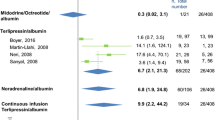Abstract
Background
Appreciation of the central role for arterial vasodilatation in the pathogenesis of hepatorenal syndrome (HRS) has led to routine use of vasoconstrictors in combination with albumin as a medical therapy for HRS. Various vasoconstrictors have been explored but the optimal approach for such therapies has not yet been established.
Aims
The purpose of this study was to examine the role of targeting an early and substantial increase in mean arterial pressure (MAP) in the management of type 1 HRS, a condition associated with very poor prognosis.
Methods
A total of 59 patients with type 1 HRS who received a combination therapy of vasoconstrictors and albumin were enrolled into a retrospective cohort study. Subjects having a substantial increase of more than 10 mmHg in MAP by day 3 after initiation of therapy were categorized as MAP responders and the rest as MAP non-responders. In addition, five patients were enrolled into a prospective pilot study in which a titration protocol of vasoconstrictors was followed to achieve early goal-directed therapy (EGDT).
Results
MAP responders achieved significantly higher incidence of treatment success or total response, less requirement of dialysis and more incidence of liver transplantation. More importantly, this response is associated with better short-term and long-term overall survival as well as transplant-free survival. The effectiveness of such an approach was further confirmed in the pilot study which followed an EGDT protocol.
Conclusions
Using an early and substantial increase in MAP as a therapeutic target is associated with favorable clinical outcomes in the management of type 1 HRS.



Similar content being viewed by others
References
Gines A, Escorsell A, Gines P, et al. Incidence, predictive factors, and prognosis of the hepatorenal syndrome in cirrhosis with ascites. Gastroenterology. 1993;105:229–236.
Gines P, Guevara M, Arroyo V, Rodes J. Hepatorenal syndrome. Lancet. 2003;362:1819–1827.
Chok KS, Fung JY, Chan SC, et al. Outcomes of living donor liver transplantation for patients with preoperative type 1 hepatorenal syndrome and acute hepatic decompensation. Liver Transpl. 2012;18:779–785.
Restuccia T, Ortega R, Guevara M, et al. Effects of treatment of hepatorenal syndrome before transplantation on posttransplantation outcome. A case-control study. J Hepatol. 2004;40:140–146.
Ruiz-del-Arbol L, Monescillo A, Arocena C, et al. Circulatory function and hepatorenal syndrome in cirrhosis. Hepatology. 2005;42:439–447.
Angeli P, Volpin R, Gerunda G, et al. Reversal of type 1 hepatorenal syndrome with the administration of midodrine and octreotide. Hepatology. 1999;29:1690–1697.
Wong F, Pantea L, Sniderman K. Midodrine, octreotide, albumin, and tips in selected patients with cirrhosis and type 1 hepatorenal syndrome. Hepatology. 2004;40:55–64.
Sanyal AJ, Boyer T, Garcia-Tsao G, et al. A randomized, prospective, double-blind, placebo-controlled trial of terlipressin for type 1 hepatorenal syndrome. Gastroenterology. 2008;134:1360–1368.
Ortega R, Gines P, Uriz J, et al. Terlipressin therapy with and without albumin for patients with hepatorenal syndrome: results of a prospective, nonrandomized study. Hepatology. 2002;36:941–948.
Martin-Llahi M, Pepin MN, Guevara M, et al. Terlipressin and albumin vs albumin in patients with cirrhosis and hepatorenal syndrome: a randomized study. Gastroenterology. 2008;134:1352–1359.
Duvoux C, Zanditenas D, Hezode C, et al. Effects of noradrenalin and albumin in patients with type i hepatorenal syndrome: a pilot study. Hepatology. 2002;36:374–380.
Giostra E, Ruedin P, Cunningham M, et al. Sustained effects of ornipressin in hepatorenal syndrome. J Hepatol. 1995;22:120–121.
Alessandria C, Ottobrelli A, Debernardi-Venon W, et al. Noradrenalin vs terlipressin in patients with hepatorenal syndrome: a prospective, randomized, unblinded, pilot study. J Hepatol. 2007;47:499–505.
Singh V, Ghosh S, Singh B, et al. Noradrenaline vs. terlipressin in the treatment of hepatorenal syndrome: a randomized study. J Hepatol. 2012;56:1293–1298.
Kiser TH, Fish DN, Obritsch MD, Jung R, MacLaren R, Parikh CR. Vasopressin, not octreotide, may be beneficial in the treatment of hepatorenal syndrome: a retrospective study. Nephrol Dial Transpl. 2005;20:1813–1820.
Nazar A, Pereira GH, Guevara M, et al. Predictors of response to therapy with terlipressin and albumin in patients with cirrhosis and type 1 hepatorenal syndrome. Hepatology. 2010;51:219–226.
Velez JC, Nietert PJ. Therapeutic response to vasoconstrictors in hepatorenal syndrome parallels increase in mean arterial pressure: a pooled analysis of clinical trials. Am J Kidney Dis. 2011;58:928–938.
Boyer TD, Sanyal AJ, Garcia-Tsao G, et al. Predictors of response to terlipressin plus albumin in hepatorenal syndrome (hrs) type 1: relationship of serum creatinine to hemodynamics. J Hepatol. 2011;55:315–321.
Salerno F, Gerbes A, Gines P, Wong F, Arroyo V. Diagnosis, prevention and treatment of hepatorenal syndrome in cirrhosis. Gut. 2007;56:1310–1318.
Umgelter A, Reindl W, Franzen M, Lenhardt C, Huber W, Schmid RM. Renal resistive index and renal function before and after paracentesis in patients with hepatorenal syndrome and tense ascites. Intensive Care Med. 2009;35:152–156.
Malbrain ML, Cheatham ML, Kirkpatrick A, et al. Results from the international conference of experts on intra-abdominal hypertension and abdominal compartment syndrome. I. Definitions. Intensive Care Med. 2006;32:1722–1732.
Acknowledgments
Geetha Maddukuri was supported by an educational fund from the US Department of Veteran Affairs. We are grateful to the Saint Louis University hepatology team including Drs. Alex Befeler, Brent Neuschwander-Tetri, Lliana Bouneva, Adrian Di Bisceglie, and Bruce Bacon for their support during the study period.
Conflict of interest
None.
Author information
Authors and Affiliations
Corresponding author
Rights and permissions
About this article
Cite this article
Maddukuri, G., Cai, C.X., Munigala, S. et al. Targeting an Early and Substantial Increase in Mean Arterial Pressure Is Critical in the Management of Type 1 Hepatorenal Syndrome: A Combined Retrospective and Pilot Study. Dig Dis Sci 59, 471–481 (2014). https://doi.org/10.1007/s10620-013-2899-z
Received:
Accepted:
Published:
Issue Date:
DOI: https://doi.org/10.1007/s10620-013-2899-z




